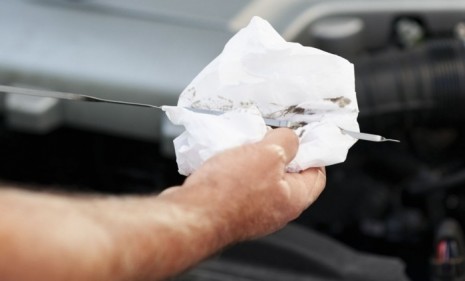The 3,000-mile oil change 'myth'
It turns out your car might drive fine for 10,000 miles without new oil — no matter what Jiffy Lube tells you. A quick guide

A free daily email with the biggest news stories of the day – and the best features from TheWeek.com
You are now subscribed
Your newsletter sign-up was successful
Growing up, most of us learned to religiously change our car's oil every 3,000 miles, says Alina Tugend in The New York Times. "But sometimes we need to throw aside our parents' good advice," and this is one of them. Consumer advocates and environmentalists are increasingly vocal about pointing out that newer cars can often go 10,000 miles between oil changes. Why has the "3,000-mile myth" persisted — and is it really a myth?
Where did the 3,000-mile rule come from?
Every 3,000 miles used to be "a good guideline," says Philip Reed at Edmunds.com — not to mention a quasi-mantra repeated by mechanics and parents. But people no longer need to "do what their dad did with his '55 Chevy," says Kristen Huff, a representative of the oil-testing service Blackstone Laboratories.
The Week
Escape your echo chamber. Get the facts behind the news, plus analysis from multiple perspectives.

Sign up for The Week's Free Newsletters
From our morning news briefing to a weekly Good News Newsletter, get the best of The Week delivered directly to your inbox.
From our morning news briefing to a weekly Good News Newsletter, get the best of The Week delivered directly to your inbox.
What's changed?
Technology. In the past eight years or so, engine advances and oil-chemistry breakthroughs have made newer cars capable of going at least 7,500 miles, or even 15,000 miles, between changes.
Why hasn't the 3,000-mile rule kept pace?
Tradition and marketing. "The Jiffy Lubes of the world have done a good job convincing people" of the need for new oil every three months or 3,000 miles, says Honda spokesman Chris Martin. Also, "3,000 miles strikes a deep chord with the consumer," Edmunds' Reed says. "It feels good to get an oil change." Received wisdom is hard to shake, laments Susan Reimer in The Baltimore Sun: I've staked "my authority as family conscience" on "preaching the 3,000-mile doctrine... if I have been wrong about oil changes, what else have I been wrong about?"
A free daily email with the biggest news stories of the day – and the best features from TheWeek.com
What happens if you change the oil too infrequently?
"The oil becomes less effective as a lubricant," says Mark Huffman at the website Consumer Affairs, and "the engine parts can quickly wear out."
So, how often should I change my oil?
It depends on your car's age and make, and whether you primarily use it for short distances or longer hauls. With vehicles built before 2002, "you should probably stick with a 3,000 mile oil change," says Huffman. For later models, "Cars.com experts split the difference" between 3,000 and 10,000 miles, offering a "best estimate" of every 5,000 miles for the "vast majority" of cars. For model-specific advice, check your car's manual, or this chart created by California's waste management board.
Should I just ignore the oil-change reminder on my front windshield?
If you've done your research and think your car should go 7,500 miles between changes, "ask questions" when "the mechanic slaps on a [3,000 miles] sticker," says Alina Tugend in The Times. Be careful, though, says Anthony Gelinas at European Cars. The mechanic offering the "cheap change" at the "local quick lube" is probably being told to put in lesser-quality oil that needs to be changed more often. If you want to go 10,000 miles between changes, go to your dealer.
Sources: New York Times, Baltimore Sun, European Car, Consumer Affairs, UW Madison Post, CalRecycle
-
 American universities are losing ground to their foreign counterparts
American universities are losing ground to their foreign counterpartsThe Explainer While Harvard is still near the top, other colleges have slipped
-
 How to navigate dating apps to find ‘the one’
How to navigate dating apps to find ‘the one’The Week Recommends Put an end to endless swiping and make real romantic connections
-
 Elon Musk’s pivot from Mars to the moon
Elon Musk’s pivot from Mars to the moonIn the Spotlight SpaceX shifts focus with IPO approaching